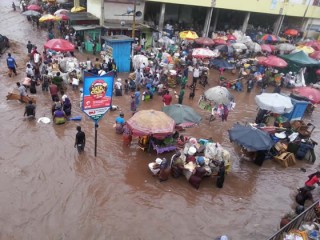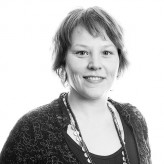Project Results:
Flash flood forecasting app
Smart water solution on flood resilience
About the project
This project aimed at the development and piloting of a Flash Flood App for a valley in central Accra that is prone to flash floods. The app provides early warning for flooding by using state-of-the art modelling techniques. Satellite data is transformed into highly detailed rainfall data and forecast of flood levels, enabling non-technical users (e.g. civilians) to become more resilient to urban flash floods. The app provides push messages for upcoming heavy rainfall events and shows the predicted flood area on street level. An innovative, fast and accurate system that is unique in the world.
Flood Risk Assessment Methods in Accra, Ghana, another VIA Water project, is a student study on the impact of waste on hydrology in the same catchment, coordinated by HKV Lijn in Water.
Key results
-
Development of a relevant and usable tool.
-
The process of development has been important in understanding and raising awareness on the processes behind the flash floods and warning systems.
-
The app induced RoyalHaskoning DHV to start a ‘product trail’ at company level for flood prediction and related awareness and prevention measures.
Tips for the future
-
Instead of a very technical approach, a more continuous client interaction during the design stage works better. Especially because the App required a system change in disaster management operations.
-
Having applicable funding/revenue streams is crucial to the maintenance of the service.
Potential for growth
RHDHV has got a contract for Sydney in Australia, which is including the building of a 2.0 version of the App. They are also in negotiation with the World Bank for an approach for the entire African continent.
Project partners
Royal HaskoningDHV, Infoplaza, Nadmo, Nelen Schuurmans
Period
December 2015 - December 2017
Location
Accra, GhanaLast project updates
Background
Accra's increased urbanization has led to high frequency of dangerous flash floods. Communities like Alogboshi, Avenor and Odawna are flooded several times a year during raining season. The flood comes very fast and is especially dangerous when it occurs during the night. Coming years, the Accra Metropolitan is expected to expand even further (60% in coming 30 years).
Besides material damage people drown due to these flash floods or get seriously ill. The poor are the most vulnerable.
This project is a spin off of a more general national warning programme under UNDP. NADMO has established a special project for Community Resilience through Early Warning (CREW). Like Rotterdam, Accra is member of the 100 Resilient Cities programme of the Rockefellor Foundation. The developed tools could be applied in many other cities.
Project Plan
The project plan consist of the following tasks: Task 1: Data collection Task 2: Setup 3Di model Task 3: Field visit and validation Task 4: Setup Rainfall prediction system Task 5: Setup Early Warning System (3Di model) Task 6: Setup mobile application. From the start of the project special attention will be paid to the setup of a sustainable business model
Target group
The real target group are the inhabitants of the Low Income areas in the lower Ondwana Catchment. Attention will be given to the specific needs of women. NADMO staff is the second target group, that aims to improve its preventive measures.
Sustainability
The project adheres to the FIETS principles for sustainability.
On finance, it looks at revenue models to sustain and update the developed app and systems
On institutional level NADMO, the meteorological Institute and District Authotities are involved.
The project is addressing environmental issues. The functioning of the system will greatly depend on other preventive environmental measures, such as the cleaning of drainage channels and waste collection.
Technically, the system is using different data sources, to spread the risk that one source might not be working.
Socially, the design is made in consultation with the local communities with a specific focus on women.
Overview of Goals
To develop an application that helps the most vulnerable ones to protect themselves better to future floodings and which is free for them with the help of co-funding from private sector.
Results and indicators
- working FFF application for a pilot area within Accra Metropolitan
- Flash flood warnings provided in time and with sufficient accuracy
- number of flash floods with good forecast and timely provided warning in two years >70% ( target )
- Business plan for sustainable update and running of app

